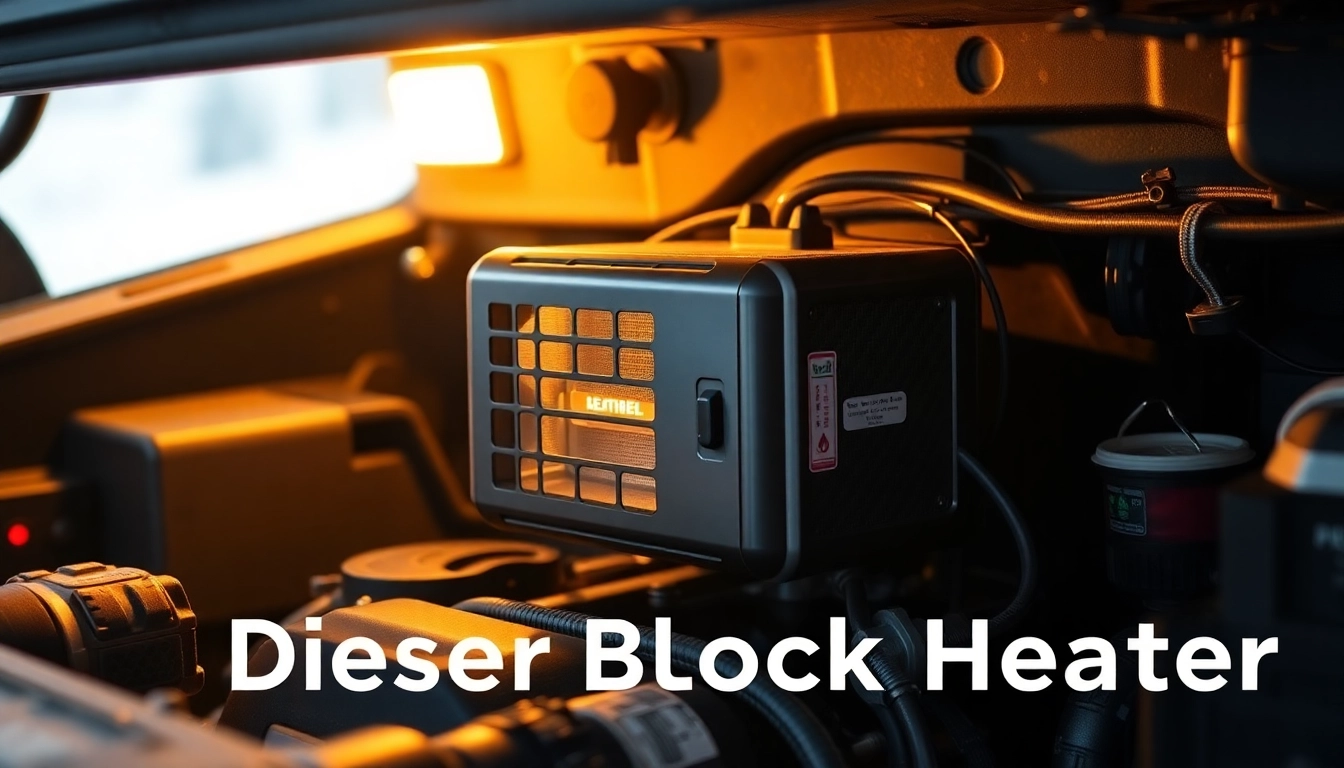Understanding Diesel Block Heaters
What is a Diesel Block Heater?
A diesel block heater is an electrical device designed to warm the engine of a diesel vehicle, improving performance in cold weather. It connects to the engine block and circulates heat to ensure that engine oil, coolant, and other components reach an optimal operating temperature before starting. This crucial device not only facilitates easier starting of the engine but also aids in reducing wear and tear associated with cold starts.
How Diesel Block Heaters Work
Diesel block heaters typically operate on a simple principle: heating the engine’s coolant or oil to prevent thickening due to low temperatures. When plugged in, electricity flows through a resistor, generating heat that is transferred to the engine block. This action is vital because diesel fuel viscosity increases at low temperatures, making it harder for the engine to start. By pre-heating the engine components, a diesel block heater allows the engine to start more smoothly and efficiently.
Key Features to Look For
When selecting a diesel block heater, consider the following features:
- Wattage: Higher wattage ensures faster heating times.
- Durability: Look for corrosion-resistant materials.
- Ease of installation: Some models are designed to be user-friendly.
- Compatibility: Ensure the block heater fits your specific engine model.
- Safety features: Look for built-in thermoregulators to prevent overheating.
Benefits of Using a Diesel Block Heater
Improved Engine Start-Up
One of the primary benefits of using a diesel block heater is the significant improvement in engine start-up performance in cold weather. Research indicates that diesel engines require a higher starting intensity due to their compression ignition mechanism. With a block heater warming the engine, drivers can expect easier starts, reducing the stress on the battery and other electrical systems.
Enhancing Engine Longevity
Using a diesel block heater can extend the life of your engine. When the engine is warmed up before starting, it reduces internal friction and wear caused by cold starts. A study by engine manufacturers shows that thermal stress during cold starts can be one of the leading causes of engine failure over time. By mitigating this stress, block heaters contribute to the longevity of diesel engines.
Fuel Efficiency During Cold Weather
Cold temperatures generally result in less efficient combustion, which can lead to increased fuel consumption. By ensuring the engine operates at its optimal temperature, a diesel block heater promotes efficient fuel use. Many users report that their fuel economy improves noticeably during the colder months when utilizing a block heater.
Installation of Diesel Block Heaters
Choosing the Right Location
Installing a diesel block heater requires careful consideration of location. The heater must be positioned to effectively reach the engine components, typically in the coolant or oil passages. Additionally, it should be easily accessible for plugging in and requires a power outlet that can handle the heater’s electrical load, typically 120V.
Safety Precautions During Installation
Safety should be a top priority when installing a diesel block heater. Always disconnect the battery before beginning installation to prevent any electrical accidents. Ensure that the heater is compatible with the engine specifications to avoid overheating or damage. Following the manufacturer’s guidelines will also help in maintaining safety standards during installation.
Common Installation Mistakes
Some common installation mistakes include:
- Incorrectly connecting the heater leads, which can cause a malfunction.
- Failing to secure the heater correctly, risking damage from vibration.
- Not checking for coolant leaks, which can lead to an ineffective heating process.
By taking time to carefully install and verify each step, these mistakes can be easily avoided.
Maintenance Tips for Diesel Block Heaters
Regular Inspections
Regularly inspecting your diesel block heater is crucial for ensuring its functionality. Check electrical connections, look for signs of wear or damage, and ensure the cord is not frayed. Periodic assessments of the heater’s performance will prevent future issues and keep the system running efficiently.
Cleaning and Upkeep
Keeping your diesel block heater clean helps in minimizing the accumulation of debris and dirt that can disrupt its performance. Use a damp cloth to wipe down the exterior regularly, and ensure that no obstructions are present around the heater that would inhibit its operating environment.
Troubleshooting Common Issues
Common troubleshooting issues include:
- Not heating: This could indicate a broken element or electrical issue.
- Overheating: May occur due to incorrect installation or a malfunctioning thermostat.
- Unusual noises: Could suggest loose components or improper installation.
By addressing these issues promptly, users can maintain the heater’s operational efficiency and longevity.
Frequently Asked Questions about Diesel Block Heaters
When Should You Use a Diesel Block Heater?
In general, it is advisable to use a diesel block heater when temperatures drop below 20 degrees Fahrenheit. However, individual vehicle specifications and local climate conditions may influence this recommendation. Drivers should consider their particular circumstances and cold weather exposure when deciding when to plug in their heaters.
Can You Leave a Diesel Block Heater Plugged In Overnight?
Leaving a diesel block heater plugged in overnight is typically safe and can be beneficial, especially in extremely cold conditions. However, manufacturers usually recommend that it be plugged in for 2-4 hours before starting the engine, which can prevent excessive energy use while effectively maintaining optimal engine temperature.
Alternative Heating Methods for Diesel Engines
For those without a block heater, there are several alternative methods to heat diesel engines, including:
- Using an oil pan heater, which directly warms the oil.
- Employing a coolant heater that circulates warm coolant in the engine block.
- Storing the vehicle in a heated garage or implementing an insulated cover to retain heat.
Though these alternatives may not be as effective as a dedicated block heater, they can still assist in maintaining better engine start-up conditions in cold weather.



